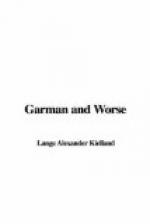“You once gave me some advice. You see, I attack each point separately, so as to prevent confusion, to avoid wasting words, or forgetting anything important. But to return. When you advised me to come forward as an authoress, I did not at that time think that your idea was reasonable. Since then I have, however, thought the subject carefully over, and have indeed made some small attempts that way, and now I beg to thank you for the good advice you gave me. I have indeed much to thank you for.
“Now that I am able to work, I no longer feel so apprehensive about the future. It is true, as you said long ago, that there are many things which a woman may have to write about, and this is more especially true with us in our own country. I am fortunately in an independent position, bonheur oblige, and I have courage, so I will make the attempt. But I must first get home, not only because I am as homesick as a child—for I know perfectly well that when I have been at home for a short time, I shall be anxious to start again on my travels—but I feel that if I am to accomplish anything, I must be among those I wish to help. I also wish to be able to go abroad again, and thus make existence more interesting; but I must at the same time have a pied a terre at home, so as to be able to return whenever I may desire to do so. And now comes the great ‘but’ which is, in fact, the chief point in this letter—and that, Mr. Worse, is yourself.
“I do not wish to return home before I know clearly in what position we stand to each other. Of this I feel convinced, that you have no ill feeling towards me on account of my former behaviour to you. But still I know nothing further; and if there is nothing more to know, I hope we may meet as good friends. If there should be anything further, kindly let me have a few lines.
“There, now! you see how the
matter lies; let us now understand each other plainly,
and I beg that you will be honourable and straightforward
towards me. On one thing you can count for a certainty,
which is, that I am, in any case,
Your very sincere friend,
RACHEL GARMAN.”
When Jacob Worse had read this letter, he sprang up, seized his hat and umbrella, and went into the clerk’s office.
“Has the Hamburg steamer started?”
“No, sir, but the first bell has just rung,” was the answer.
“Have you any gold?”
“Yes; that is to say, not very much,” answered the cashier.
“Let me have what you have got, and send Thomas over to the bank for some more. A couple of thousand kroner or so will do.”
The boy ran off with a bundle of notes and a little canvas bag.
“I am going abroad, Svendsen, for a fortnight or so—I cannot say for certain. Look, here is my address. And with that he snatched the pen from behind Svendsen’s ear and wrote across a large sheet of paper, on which the unfortunate man had just begun a magnificent letter:




